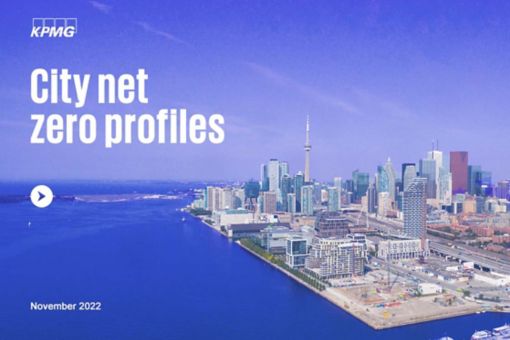Cities and regions are important actors in the fight against global warming, as reflected in the theme for the COP27 UN Climate Change Conference in Cairo, ‘Together for Implementation’.
KPMG's inaugural Net Zero Readiness Spotlight: Cities report evaluates the status and progress of 50 cities in the reducing greenhouse gas emissions across five sectors by assessing mitigation, adaptation, equitable climate action and city-readiness to achieve net zero emissions by 2050.
It further assesses their readiness to leverage transition drivers such as technology, climate finance, innovative partnerships and the circular economy, while striving to ensure equity, and effective climate governance.
The NZSC draws on the experience of the global organisation of KPMG firms to analyse each city's transition to net zero, discussing the opportunities, challenges and successes in specific sectors. It includes global observations and insights from KPMG specialists on how these sectors can accelerate towards net zero driven by bold city action.
Key insights
Most cities across the world have put in place ambitious climate emergency and net-zero climate action plans, but city-led action may be affected by lagging financial, policy and regulatory barriers.
Cities must work collaboratively with key stakeholders to put in place the necessary infrastructures and incentives needed to make significant progress towards meeting net-zero targets and goals. They need to implement robust and agile climate governance structures and take charge of educating and encouraging behavioural change, especially on consumption choices, waste management, recycling and mobility options.
A global transition to net zero needs financial resources beyond that of cities and national governments. Private capital will likely need to be unlocked to deploy climate solutions to facilitate transitions on a large scale. Cities need to be able to develop bankable and investable projects that are de-risked to attract private sector investors. Mitigation efforts need to be complemented by adaptation efforts to accelerate net-zero action. Adaptation finance is therefore essential.
The sustainable finance market is expanding to include ‘climate fintechs’. This new category of investors aims to catalyse decarbonisation by combining finance, climate and technology. Cities need to be abreast of the growing and fast-paced sustainable finance market to position themselves to attract capital to accelerate climate action.
Most cities have either updated or incorporated their climate action plans to focus on equity in several ways. Cities should aim to ensure that climate equity is not only recognised but procedural in encouraging participation from disenfranchised groups and distributional in ensuring that climate action gains are redistributed effectively.
Developing cities typically have a smaller carbon footprint than developed cities. Despite this, they face harsh climate impacts and tight city fiscal opportunities that impact their ability to adequately respond to equity concerns.
The focus on structural problems should be at the core of policy development and implementation. Realising climate equity and striving to ensure a just transition in cities may require out-of-the-box solutions and thinking and partnerships to help ensure that marginalised and disadvantaged communities can not only benefit but also avoid further disenfranchisement.
Tracking urban climate action at the city level is challenging, particularly in developing cities. Cities need to be equipped with the right tools to assist them in setting goals, implementing their climate action plans and tracking progress. The need to have common data points that are useful for planning and the financial resources to host data and information are critical.
Big data and artificial intelligence are critical for meeting cities’ ambitious net-zero goals. Cities should leverage big data by creating digital twins — virtual versions of the urban environments — using insights to help meet climate goals. The interoperability of data and information needs strengthening at the city level to help ensure a well-organised transition to net zero.
Cities need a diverse set of partners and collaborators to achieve emissions reduction in their respective jurisdictions. These include private sector organisations, national governments, communities, non-governmental organisations and other traditional partners. Cross-sector partnerships to inspire change and to explore new ideas will be critical in meeting city net-zero targets. Cities should also focus on collaborating with their communities.
The latest Intergovernmental Panel on Climate Change (IPCC) reports highlight the significance of negative emissions technologies (Nets) due to previous failures in global climate protection. Cities need to leverage research and development to help ensure that technologies in development match needs and realities on the ground.
In this regard, cities need to work collectively and collaboratively with private-sector partners to help ensure they can benefit from climate technologies. Digitising cities and the role of smart cites can be an opportunity to integrate climate change. Carbon removal technologies are also essential in the transition to net zero.

Sector scorecards: analysis
City progress in terms of climate action across sectors

City net-zero profiles
Profiling cities as they transition to net zero
Get in touch
Connect with us
- Find office locations kpmg.findOfficeLocations
- kpmg.emailUs
- Social media @ KPMG kpmg.socialMedia




